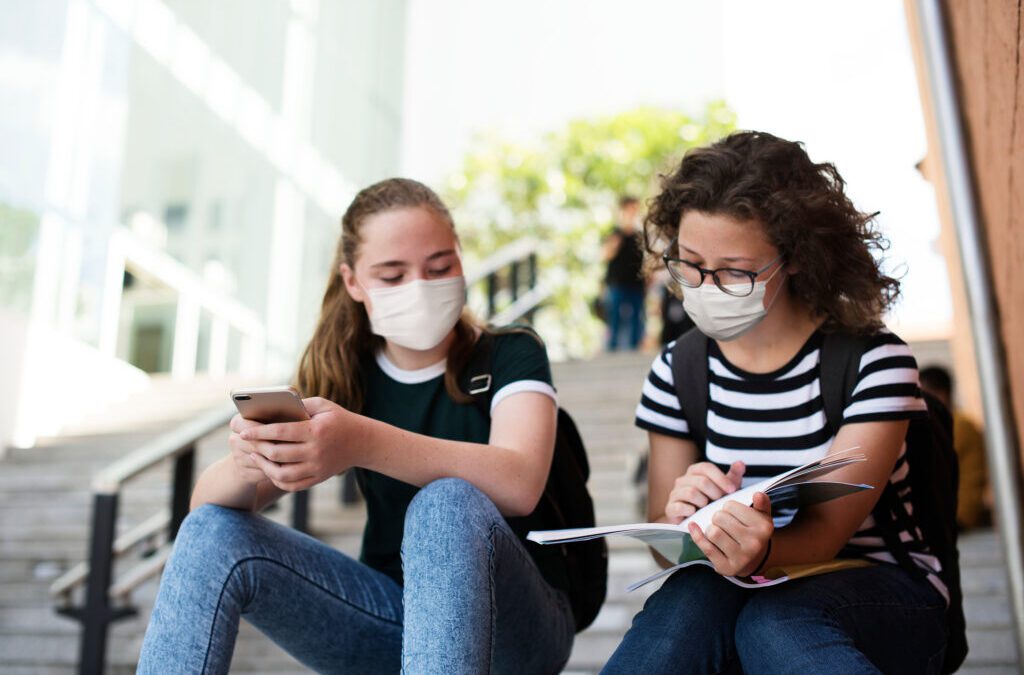Returning to school can be a time of excitement for many students who are eager to reconnect with friends. However, for some teens it can feel like a loss of the freedom and fun they associate with summertime. Still for others, the change in routine and increasing social demands can cause self-consciousness and anxiety.
The COVID-19 Factor
The COVID-19 pandemic has added another level of confusion and stress for most students. After a year and a half of telling our young people that human contact can be dangerous, that we cannot get within six feet of people outside our household, and that touching anything might make you sick, it’s baffling to the young mind to now imagine a classroom full of students with their previous friendly and rambunctious behaviors. Life can feel less predictable than it has ever been.
Supporting Your Child
How do we help our children make sense of the changing world and fluctuating rules around masks, socializing, and distancing?
As you have probably already been doing, notice what is going on with your child. Trust your instincts. We all handle stress differently. Your child may be angry, tearful, easily frustrated, sad and withdrawn, nervous and avoidant, confused and forgetful—all good reasons to be concerned and to try and be more supportive.
The Importance of Listening
Find a time when there are no immediate demands on your child and gently share with them the changes you have noticed. Be prepared to listen. If you need to prompt with questions, keep them open-ended. “How are you feeling about returning to school?” “What do you think will be different in your classrooms?” “What are you most looking forward to this school year?” “How are you feeling about returning to school with COVID-19 in the news every night?”
Seven Tips for Starting School Successfully
Here are a few suggestions to help your child manage the stresses associated with returning to school this fall.
- Have your child participate in back-to-school planning. This might include shopping for backpacks and school supplies, buying new clothes or shoes for school, checking the school schedule online, and planning out a homework station.
- Acknowledge their fears and explore where they do have control—they can wear masks, keep physical distance, wash their hands, and practice self-care.
- Talk about stressful experiences as opportunities to learn and develop new skills. Stress is not bad or good, it is just a part of life, and we all want to expand our ability to access our wise mind, make good choices, and take care of ourselves when stress presents itself.
- Make time for exercise, silliness, and doing things your child loves or is great at.
- Be caring and curious: “Are you okay?” “What are you concerned about with school starting?” “Would you like my help to figure this out?”
- Some students need ideas for how to handle unexpected challenges from their peers.
- Remind them they can always ask for a break and walk away from a stressful interaction. They are taking care of themself in the moment, will have a chance to think about what was happening, and choose how they want to respond. They can always talk to an adult about it later.
- We all can benefit from slow, deep breathing. It really does help. Breathing out can take twice as long as breathing in, which tells your nervous system that things are OK.
- Other self-calming approaches include singing; tapping hands or feet left-right-left-right-left-right; and gently rubbing your forehead, chin, or neck.
- Let your child know how much you appreciate them sharing their feelings, concerns, and successes. You do not have to fix the problems or make it all better; just acknowledge their feelings, offer empathy, and be there for the journey.
Looking for more information? Check out the resources on Understood.org.
